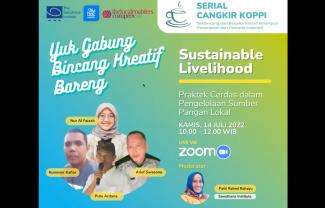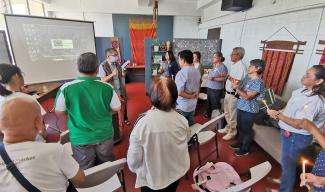Natural resources can provide a source of food, fuel, shelter and various other essential materials. They also underpin complex beliefs and traditions that can be the lifeblood of communities. In the digital era and in the midst of the 4.0 industrial revolution, many people are utilising them as the basis for sustainable livelihoods.
The multifaceted benefits of natural resources, along with the many sustainable ways in which they can successfully be utilised, was the topic of discussion among four experts at an online seminar held by the Samdhana Institute on Thursday, 14 July 2022. Entitled “Creative Talking and Thinking in Inspirational Women and Youth Groups”, or Cangkir Koppi discussion series. The webinar was moderated by Patti Rahmi Rahayu. This time, the webinar raised topic of Smart Practices in Managing Local Food Resources.
Kumeser Kafiar is the Programme Coordinator of Kainkain Karkara Byak; a customary council of Indigenous Peoples (IP) in the Padaido area of Papua in Indonesia. He discussed a number of smart practices in managing local food resources, particularly in relation to the sustainable management of natural resources according to customary regulations that are developed and implemented by the Adat Bar Padaido Institute.
“Customary institutions can resolve problems and claims, including resolving internal and external problems, by punishing people who violate customary rules," said Kafiar. "But so far it is still limited to strengthening the structure,” he added. “We continue to support this customary institution to issue customary regulations for all people in Padaido related to natural resource management.”
This approach can be seen in the management of coastal tourism in Sariba Village, Papua. The beach in this area is home to various kinds of coral reefs that make it ideally suited to snorkelling and diving trips. In addition, the white sandy stretch of shoreline makes for an idyllic holiday destination.
In order to regulate the tourist area and ensure its sustainability, Kafiar and Kainkain Karkara Byak collaborated with a group of five IP, comprising a mix of village residents and church administrators. Together, they made a commitment to manage the natural resources in Padaido, while also utilising them to their full potential.
Elsewhere, in the central region of Bali, the Head of Baga Raksa Alas Mertajati, Putu Ardana, has been encouraging organic farming in the buffer area of Alas Mertajati, which is also home to several natural springs. As an institution with special focus on Alas Mertajati, Baga Raksa Alas Mertajati educates all levels of society, encouraging them to return to the consumption of organic foods.
"Organic food is increasingly being ignored,” lamented Ardana, noting the essential health benefits this food is able to provide. “Not only that – it has a lot of potential, develops quickly and can be grown wild in people's gardens,” he added.
He continued that products made from organic materials were generally seen as being less desirable than processed products sourced from outside the community. One example he gave was the prevalence of instant noodles. Compared to these convenient but unhealthy foods, organic alternatives are infinitely more beneficial.
"Not only are (organic foods) rich in fibre, but there are also sources of carbohydrates such as tubers that can replace rice and instant noodles," said Ardana. On 1 July 2022, Baga Raksa Alas Mertajati held a culinary festival in four villages, serving food using local ingredients and recipes in each location in order to revive residents' interest in eating organic food.
"There were no foreign recipes or Western food,” says Ardana, who also invited chefs from five-star hotels to attend the event and sample the culinary delights of organic produce. “The response was extraordinary,” he says, noting that the chefs were impressed by the quality of the food on offer. “It was encouraging for us," he added.
Ardana and Baga Raksa Alas Mertajati went on to hold training for small enterprises in Tamblingan to market products made from local and organic ingredients. This included creations such as chips and floss, which can be sold in a variety of locations. “We sell them in local markets and at religious events,” he explains. “The response is very good – many repeat orders – the chips are delicious, what is clear is that they are all very organic, completely untouched by chemicals," said Ardana.
Another speaker at the webinar was Arief Swasono from Batik Alam Kampung Tambudan in Berau, East Kalimantan. He presented his experiences via PowerPoint, in relation to running a business based on the use of natural waste (dried tree bark). In addition to making products to sell, Arief has also initiated eco-friendly edu-tourism around batik.
"Through batik edu-tourism we create batik using mahogany tree bark, jackfruit trunk and other natural dyes, explained Arief. “The potential for wood waste in Kalimantan is extraordinary," he added, before going on to mention that his group also plants mangrove trees and often attends blue carbon activities in Bali.
"Because we are based in ecotourism, we take advantage of the potential of nature in the hope that we don't pollute the Earth," explained Arief, who is also involved in an eco-tourism business with the Growing Berseri Mangrove group that covers 3,000 hectares of mangrove forest. This group has a number of activities, ranging from patrols and conservation activities to surveys of flora and fauna in the area.
The fourth and final speaker was Nur Alfaizah from the Bandung Bee Sanctuary; a beekeeping business that she and her friends set up in West Java. Following a little research, she concocted this unusual business model and took the lead; together with her team, she set up a beekeeping site on a rubbish tip.
"This (area) used to be used as a garbage dump,” she explained, adding that it was a shame that such a green area was – literally – going to waste. “We revitalised it, turning it into a bee sanctuary and also built a tourist education centre that introduces all the different types of bees and the honey they produce," said Nur when showing photos of the location.
Her business encourages young people and local residents to get involved and become beekeepers. After going through a long building process, the sanctuary is now finished and makes products derived from honey, such as syrup and cakes. They also sell plant seeds to visitors, so they too can help to feed the bees. The location has received unexpected attention from the government and the general public, who have celebrated the positive impact it has had on the local environment and their communities.
From organic farms to customary rights and from mangroves to rubbish dumps, local heroes are leading the way in community projects throughout Indonesia. By bringing their shared experience to the table, the Samdhana Institute hopes to create a network of projects and like-minded people who can be leaders in their communities. Like his peers at the Cangkir Koppi session held in July, Arief Swasono believes in working together and being inspired by each other’s activities. As he explains, “it cannot be separated from the support, assistance and enthusiasm received from friends."
Read more stories:




